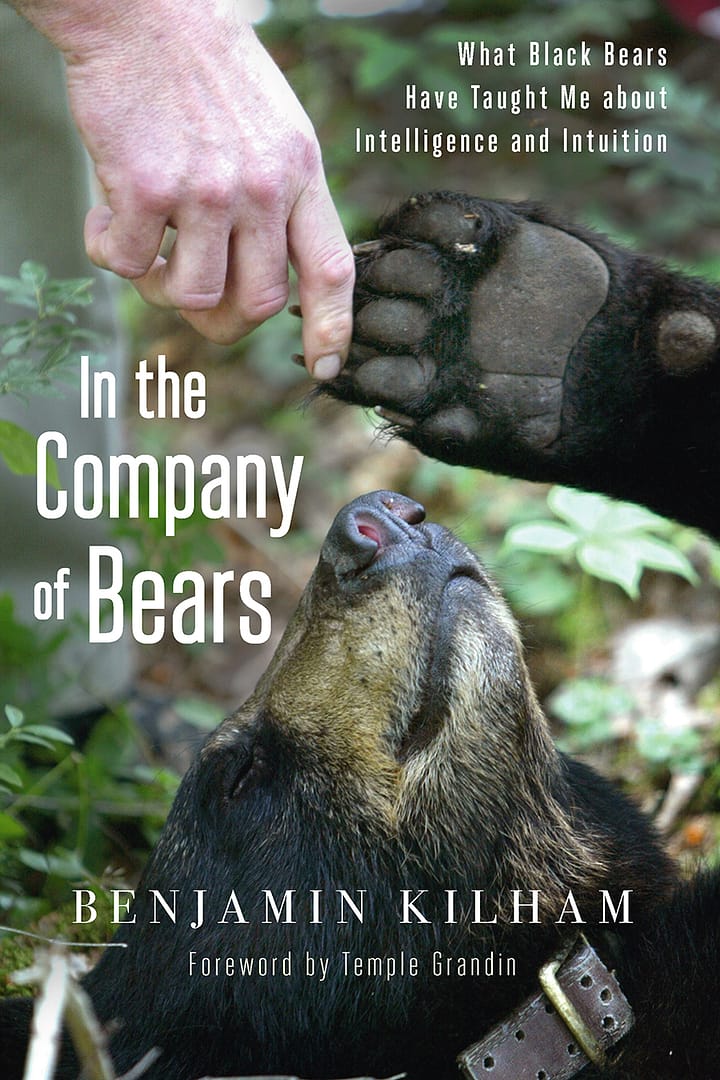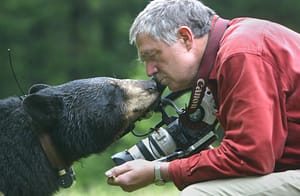In the Company of Bears
What Black Bears Have Taught Me about Intelligence and Intuition

| Pages: | 296 pages |
| Size: | 6 x 9 inch |
| Publisher: | Chelsea Green Publishing |
| Pub. Date: | September 1, 2014 |
| ISBN: | 9781603585873 |
In the Company of Bears
What Black Bears Have Taught Me about Intelligence and Intuition
Paperback
$24.95
In In the Company of Bears, originally published in hardcover as Out on a Limb, Ben Kilham invites us into the world he has come to know best: the world of black bears.
For decades, Kilham has studied wild black bears in a vast tract of Northern New Hampshire woodlands. At times, he has also taken in orphaned infants–feeding them, walking them through the forest for months to help them decipher their natural world, and eventually reintroducing them back into the wild. Once free, the orphaned bears still regard him as their mother. And one of these bears, now a 17-year-old female, has given him extraordinary access to her daily life, opening a rare window into how she and the wild bears she lives among carry out their daily lives, raise their young, and communicate.
Witnessing this world has led to some remarkable discoveries. For years, scientists have considered black bears to be mostly solitary. Kilham’s observations, though, reveal the extraordinary interactions wild bears have with each other. They form friendships and alliances; abide by a code of conduct that keeps their world orderly; and when their own food supplies are ample, they even help out other bears in need. Could these cooperative behaviors, he asks, mimic behavior that existed in the animal that became human? In watching bears, do we see our earliest forms of communications unfold?
Kilham’s dyslexia once barred him from getting an advanced academic degree, securing funding for his research, and publishing his observations in the scientific literature. After being shunned by the traditional scientific community, though, Kilham’s unique findings now interest bear researchers worldwide. His techniques even aid scientists working with pandas in China and bears in Russia. Moreover, the observation skills that fueled Kilham’s exceptional work turned out to be born of his dyslexia. His ability to think in pictures and decipher systems makes him a unique interpreter of the bear’s world.
In the Company of Bears delivers Kilham’s fascinating glimpse at the inner world of bears, and also makes a passionate case for science, and education in general, to open its doors to different ways of learning and researching–doors that could lead to far broader realms of discovery.
Reviews and Praise
Kirkus Reviews—
"The author is a state-sponsored researcher whose work with the black bear population in northern New Hampshire is safe, methodical and sanctioned. Since he does not currently hold a doctorate—he’s now working on that—much of his fieldwork has been discounted by the scientific community. On the other hand, his outsider status has allowed him to go his own way and trust in his natural skills rather than bemoan his shortcomings revolving around his dyslexia. Despite his condition, he is blessed with the ability to recognize patterns and see systems where they are not self-evident. The tone of his presentation allays criticism or hostility with its frankness and generosity, as he plunges into what he has observed: how bears use scent and body language, how they compete and cooperate, how they enforce house rules and exhibit a social code of justice and punishment, and how they communicate. Though he has interacted with hundreds of black bears, one in particular—Squirty, whom he adopted as a cub and released into the wild—has allowed Kilham to experience an intimate association with him, from comfort to anger and many other emotions in between. The author presents a solid case for bears as primal actors of social exchange—cooperation, altruism, morality—and their study, a 'gateway' to understanding 'how surplus fitness and an increase in population density have affected human behavior.' A powerfully original study of bears."
More Reviews and Praise
Booklist —
"For nearly 20 years, naturalist Kilham has fostered orphaned black bear cubs in northern New Hampshire. In his previous book, Among the Bears, Raising Orphan Cubs in the Wild (2002), he described his early efforts to teach cubs to forage, hunt, and avoid natural and human-made dangers. In this book, he recounts years of studying bears he released into the woods, especially Squirty, who has successfully raised her own cubs, who have in turn raised another generation of wild bears. Because Squirty still trusts Kilham as family, he has been able to observe bear social interactions closely. Among his discoveries are that bears socialize far more than commonly believed and occasionally exhibit altruistic behavior. Although some scientists criticize Kilham’s work, he defends his methods and likens bear society to that of primitive humans, suggesting that we can learn much about our origins from the bears. Advice for hikers encountering bears rounds out this popular-science memoir."
Library Journal —
"Animal behaviorists like Kilham (Among the Bears) are at a disadvantage in the world of science: they observe their animals in nature rather than in the lab. Severely dyslexic, Kilham was denied admission to a doctoral program: that, too, made his work suspect. But he’s raised 27 orphan bears from infancy and been friends to one bear for 14 years now. Kilham even discovered a sensory organ in black bears that helps them to determine which plants are safe to eat. In straightforward prose, Kilham sets forth what he’s learned from more than 20 years of working with bears. They aren’t loners, as thought, but inhabit a complicated world of reciprocal social arrangements that allow them to browse other bears’ territories when food is scarce in their own. They read mood and intent and discipline bears that transgress. Kilham speculates on the relevance of his observations to early human development and sees bears’ behavior as a possible analog to ours. VERDICT Anyone who enjoys reading works by Temple Grandin (who provides the foreword here), Jane Goodall, or Frans de Waal will enjoy this book. Kilham is a worthy member of a small but increasingly vocal confraternity of scientists who watch as often as they count."
"Magnificent! In the Company of Bears is a brilliant read. Kilham perfectly exemplifies how much the world has to gain from the exceptional insights of dyslexic individuals, who often possess a special talent for finding order hidden in the complex patterns of the real world. We cannot recommend this book highly enough."--Brock and Fernette Eide, authors of The Dyslexic Advantage
"Kilham's latest is the most thought-provoking book that I've read about bears. It not only made me think differently about black bears, it also enriched how I feel about them."--Stephen Herrero, biologist and author of Bear Attacks: Their Causes and Avoidance
"No one knows black bears like Ben Kilham does. During the past decade alone he has raised and rehabilitated to the wild more than 100 orphaned cubs. The social code of the bears, as so delightfully described in In the Company of Bears, includes cooperation, imitation, fairness, punishment for infraction, reciprocity, and other traits of this solitary yet highly social species. Human parallels are drawn, too. The charm and core of the book lie in its anecdotes and unique insights, especially of the female Squirty with whom Ben has had a friendship for more than seventeen years. Read this fascinating book and see the bear's world with new eyes."--George Schaller, author of The Last Panda; science director, Wildlife Conservation Society
"In the Company of Bears is a brilliant revelation about black bears and a paean to human potential. After decades spent caring for orphan bears and releasing them into the wild, Ben Kilham, a dyslexic animal lover, has now summarized what he has learned about their rich social complexity and humanlike intentionality. The result is to turn a supposedly familiar species into a creature of unsuspected acuity. Part science, part intuition, this enticing natural history is a provocative argument about animal minds, and an intimate celebration of life in the New Hampshire woods."--Richard Wrangham, author of Catching Fire: How Cooking Made us Human; co-director of the Kibale Chimpanzee Project
“In the Company of Bears by Benjamin Kilham is one of the finest books on the natural history of an animal that I have ever read. As gripping as the best novel, it is very readable and provides great insights into the mind of the black bear and the human. The research that Kilham has done on the behavior of black bears is groundbreaking and will lead us to a much better understanding of the development of intelligence in mammals and the evolution of cognition throughout the animal world."--James R. Spotila, Betz Chair Professor of Environmental Science, Department of Biodiversity, Earth and Environmental Science, Drexel University; author of Saving Sea Turtles
"Like Jane Goodall’s studies of chimps, Ben Kilham’s work with black bears is more than just revealing: it’s revolutionary. This riveting book supports two astonishing conclusions: that bears are far more sophisticated than most scientists dared imagine, and that dyslexia, once considered a failing, may simply be another, and often valuable, way of thinking. Ben’s work will transform our understanding of how animals live--and how science should be done."--Sy Montgomery, author of Walking with the Great Apes and Search for the Golden Moon Bear
"Ben Kilham's In the Company of Bears is surely the most insightful book about animals written in the last 100 years. His observation of black bears is the best ever done, his data is flawless, and these attributes have created a landmark of science that as far as I know has not been equalled with any other species. And if that’s not enough, it’s also a page-turner and a must-read. It left me breathless."--Elizabeth Marshall Thomas, author of The Hidden Life of Dogs and The Tribe of Tiger






